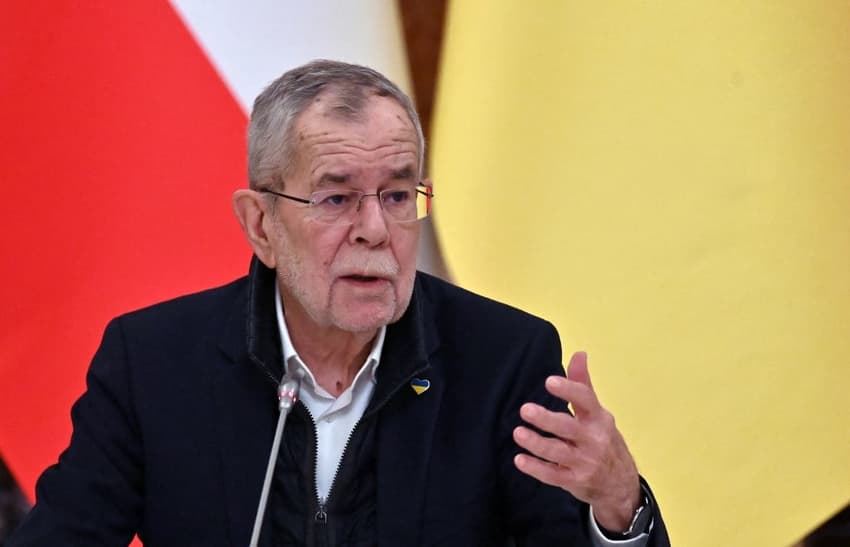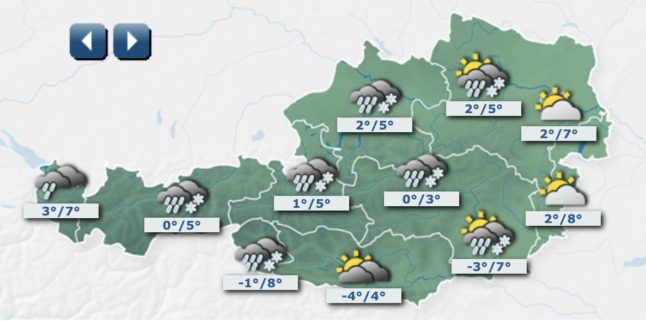Today in Austria: A roundup of the latest news on Thursday

Two accomplices of Vienna terror attacker sentenced to life in prison, Austria to drop all Covid restrictions by the end of June, and more news from Austria on Thursday.
- Austrian court sentences 2 accomplices of Vienna jihadist shooter to life in prison
A Vienna court on Wednesday sentenced two men who helped a gunman carry out Austria's first deadly jihadist attack to life in prison as the months-long trial wrapped up.
Convicted Islamic State group sympathiser Kujtim Fejzulai went on a shooting rampage on November 2, 2020 in downtown Vienna, killing four and wounding 23 others before police shot him dead.
Two years later, six defendants -- four Austrians, a Chechen and a Kosovar -- stood trial for helping Fejzulai prepare for the shooting, even though they were not directly involved in the deadly attack.
One man was sentenced to life in prison for "contributing to murder" and another was given the same sentence for participating in terrorist crimes in connection with murder -- the trial's main charge.
Another two men facing the main charge were given prison terms of 19 and 20 years respectively, while the final two of the group were acquitted of it. But they were found guilty of membership in a terrorist organisation and each was sentenced to a conditional prison term of two years.
- Austria to drop all Covid restrictions by the end of June
On Wednesday, February 1st, Austria’s federal government announced it would end all Covid-19 crisis measures by the end of June.
In a press conference, Health Minister Johannes Rauch (Greens) explained that vaccinations, tests and medications would be integrated into the regular structures of the national health system.
There will be no more free tests, except for people with symptoms and patients at risk, and those will be carried out only by family doctors or in hospitals. However, vaccination will remain free of charge and available at various points, including at family doctor’s offices.
All current measures will be dropped in phases, including mask requirements, obligation to report illness, and special rules for doctors and nursing homes, the minister said.
You can read more about it HERE.
- Tyrol and Salzburg have the lowest unemployment rate
Tyrol and Salzburg are the provinces with an unemployment rate of 4.5 percent each, well below the Austrian average (7.6 percent). In Tyrol, rates haven't been so low since 2008, ORF reported.
17,233 people were registered as unemployed on January 31, of whom just under 5,000 were women and over 12,000 men. According to AMS Tyrol, the difference in numbers is due to January being an intermediate season for the construction industry.
READ ALSO: REVEALED: What are the best paying jobs in Austria?
- Van der Bellen emphasised humanitarian aid during a solidarity visit to Kiev
Austrian President Alexander Van der Bellen chose Ukraine as his first major destination after taking office for his second term, as Der Standard reported.
"We are not leaving Ukraine alone; it is facing a war of aggression that, in my eyes, is comparable to the colonial wars in the 19th century", the president said in Kyiv.
Due to Austria's commitment to neutrality, the country is assisting Ukraine with humanitarian aid. Van der Bellen also didn't rule out the possibility of Vienna one day becoming a venue for negotiations between Ukrainians and Russians.
However, he said he didn't expect diplomatic talks to take place any time soon.
READ ALSO: Stressful learning German’: How a Ukrainian family is adapting to life in Austria
- National Council approves Protection of Whistleblowers regulation
On Wednesday, the National Council passed a new legal regulation to protect whistleblowers better, broadcaster ORF reported. Based on EU requirements, it provides for the establishment of internal and external whistleblower reporting offices in the public sector and every company with at least 50 employees.
The private sector will also receive an external, company-independent reporting office, which is to be located at the Federal Bureau of Anti-Corruption (BAK).
Individuals who report (suspected) rights violations internally or externally are protected from, among other things, termination, disciplinary action, salary cuts and other reprisals such as intimidation and bullying, and may be able to sue for damages.
READ ALSO: ‘Reforms needed urgently’: Is Austria becoming more corrupt?
- Weather

Screenshot from ZAMG
If you have any questions about life in Austria, ideas for articles or news tips for The Local, please get in touch with us at [email protected].
Comments
See Also
- Austrian court sentences 2 accomplices of Vienna jihadist shooter to life in prison
A Vienna court on Wednesday sentenced two men who helped a gunman carry out Austria's first deadly jihadist attack to life in prison as the months-long trial wrapped up.
Convicted Islamic State group sympathiser Kujtim Fejzulai went on a shooting rampage on November 2, 2020 in downtown Vienna, killing four and wounding 23 others before police shot him dead.
Two years later, six defendants -- four Austrians, a Chechen and a Kosovar -- stood trial for helping Fejzulai prepare for the shooting, even though they were not directly involved in the deadly attack.
One man was sentenced to life in prison for "contributing to murder" and another was given the same sentence for participating in terrorist crimes in connection with murder -- the trial's main charge.
Another two men facing the main charge were given prison terms of 19 and 20 years respectively, while the final two of the group were acquitted of it. But they were found guilty of membership in a terrorist organisation and each was sentenced to a conditional prison term of two years.
- Austria to drop all Covid restrictions by the end of June
On Wednesday, February 1st, Austria’s federal government announced it would end all Covid-19 crisis measures by the end of June.
In a press conference, Health Minister Johannes Rauch (Greens) explained that vaccinations, tests and medications would be integrated into the regular structures of the national health system.
There will be no more free tests, except for people with symptoms and patients at risk, and those will be carried out only by family doctors or in hospitals. However, vaccination will remain free of charge and available at various points, including at family doctor’s offices.
All current measures will be dropped in phases, including mask requirements, obligation to report illness, and special rules for doctors and nursing homes, the minister said.
You can read more about it HERE.
- Tyrol and Salzburg have the lowest unemployment rate
Tyrol and Salzburg are the provinces with an unemployment rate of 4.5 percent each, well below the Austrian average (7.6 percent). In Tyrol, rates haven't been so low since 2008, ORF reported.
17,233 people were registered as unemployed on January 31, of whom just under 5,000 were women and over 12,000 men. According to AMS Tyrol, the difference in numbers is due to January being an intermediate season for the construction industry.
READ ALSO: REVEALED: What are the best paying jobs in Austria?
- Van der Bellen emphasised humanitarian aid during a solidarity visit to Kiev
Austrian President Alexander Van der Bellen chose Ukraine as his first major destination after taking office for his second term, as Der Standard reported.
"We are not leaving Ukraine alone; it is facing a war of aggression that, in my eyes, is comparable to the colonial wars in the 19th century", the president said in Kyiv.
Due to Austria's commitment to neutrality, the country is assisting Ukraine with humanitarian aid. Van der Bellen also didn't rule out the possibility of Vienna one day becoming a venue for negotiations between Ukrainians and Russians.
However, he said he didn't expect diplomatic talks to take place any time soon.
READ ALSO: Stressful learning German’: How a Ukrainian family is adapting to life in Austria
- National Council approves Protection of Whistleblowers regulation
On Wednesday, the National Council passed a new legal regulation to protect whistleblowers better, broadcaster ORF reported. Based on EU requirements, it provides for the establishment of internal and external whistleblower reporting offices in the public sector and every company with at least 50 employees.
The private sector will also receive an external, company-independent reporting office, which is to be located at the Federal Bureau of Anti-Corruption (BAK).
Individuals who report (suspected) rights violations internally or externally are protected from, among other things, termination, disciplinary action, salary cuts and other reprisals such as intimidation and bullying, and may be able to sue for damages.
READ ALSO: ‘Reforms needed urgently’: Is Austria becoming more corrupt?
- Weather

If you have any questions about life in Austria, ideas for articles or news tips for The Local, please get in touch with us at [email protected].
Join the conversation in our comments section below. Share your own views and experience and if you have a question or suggestion for our journalists then email us at [email protected].
Please keep comments civil, constructive and on topic – and make sure to read our terms of use before getting involved.
Please log in here to leave a comment.